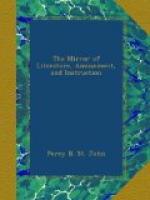he often rubbed it fiercely with his hands, or passed
his fingers quickly through his locks unconsciously,
so that it was singularly wild and rough. In times
when it was the mode to imitate stage-coachmen as
closely as possible in costume, and when the hair
was invariably cropped, like that of our soldiers,
this eccentricity was very striking. His features
were not symmetrical, (the mouth, perhaps, excepted,)
yet was the effect of the whole extremely powerful.
They breathed an animation, a fire, an enthusiasm,
a vivid and preternatural intelligence, that I never
met with in any other countenance. Nor was the
moral expression less beautiful than the intellectual;
for there was a softness, a delicacy, a gentleness,
and especially (though this will surprise many) that
air of profound religious veneration, that characterizes
the best works, and chiefly the frescoes, (and into
these they infused their whole souls,) of the great
masters of Florence and of Rome. I recognised
the very peculiar expression in these wonderful productions
long afterwards, and with a satisfaction mingled with
much sorrow, for it was after the decease of him in
whose countenance I had first observed it. I admired
the enthusiasm of my new acquaintance, his ardour in
the cause of science, and his thirst for knowledge.
I seemed to have found in him all those intellectual
qualities which I had vainly expected to meet with
in an University. But there was one physical blemish
that threatened to neutralize all his excellence.
“This is a fine, clever fellow!” I said
to myself, “but I can never bear his society;
I shall never be able to endure his voice; it would
kill me. What a pity it is!” I am very
sensible of imperfections, and especially of painful
sounds—and the voice of the stranger was
excruciating; it was intolerably shrill, harsh and
discordant; of the most cruel intension—it
was perpetual, and without any remission—it
excoriated the ears. He continued to discourse
of chemistry, sometimes sitting, sometimes standing
before the fire, and sometimes pacing about the room;
and when one of the innumerable clocks that speak in
various notes during the day and the night at Oxford,
proclaimed a quarter to seven, he said suddenly that
he must go to a lecture on mineralogy, and declared
enthusiastically that he expected to derive much pleasure
and instruction from it. I am ashamed to own
that the cruel voice made me hesitate for a moment;
but it was impossible to omit so indispensable a civility—I
invited him to return to tea; he gladly assented, promised
that he would not be absent long, snatched his cap,
hurried out of the room, and I heard his footsteps,
as he ran through the silent quadrangle, and afterwards
along the High-street. An hour soon elapsed,
whilst the table was cleared, and the tea was made,
and I again heard the footsteps of one running quickly.
My guest suddenly burst into the room, threw down
his cap, and as he stood shivering and chafing his
hands over the fire, he declared how much he had been




